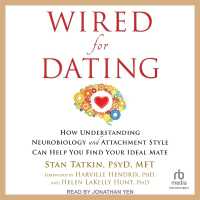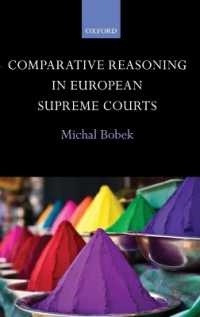- ホーム
- > 洋書
- > 英文書
- > Psychology
Full Description
This book explores the psychoanalytic concept of castration and its relation to human sexuality. The central argument is that the contemporary perceptions of sexuality as 'natural' or 'given' or as something that one is born with, are problematic from a psychoanalytic perspective. Drawing from Freud's work, the author investigates the formulation of the Castration Complex in order to highlight its close connections to the psychosexual development of human beings. The findings are also compared to Lacan's work in order to highlight the point of departure and similarities between the two theorists' formulation of the Castration Complex and its relation to sexuality. Using several core Freudian texts and some of Lacan's seminars the author examines how do we acquire our sexual identity, position or orientation. Most of all, the author explores what can we learn from the psychoanalytic concept of the Castration Complex about our sexuality? The author argues that despite the obvious difference in time, Freudian theories coupled with Lacan's have much to offer and are extremely useful in understanding the twenty-first-century subjects and their struggle with sexuality.
Contents
Foreword
Chapter 1 Castration complex for Freud between 1907-1909
Chapter 2 Castration complex for Freud in 1925
Chapter 3 Freud's theories of Castration in Female Sexuality (1931b)
Chapter 4 Brief introduction to bisexual disposition and its place within Freud's psychoanalytic theories
Chapter 5 New Introductory Lectures on Psychoanalysis - Lecture XXXIII Femininity (1933a)
Chapter 6 Castration for Lacan Seminar IV (1956-57)
Chapter 7 The fate of infantile sexual research questions








